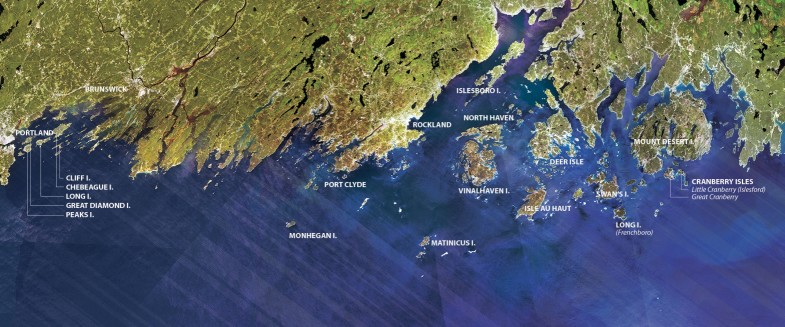
ROCKLAND, ME – Island Institute announced today that it has received a $240,000 grant through the Gulf Research Program of the National Academies of Sciences, Engineering, and Medicine to fund a collaborative project that focuses on disaster preparedness in Maine’s island and coastal communities and addresses threats faced from environmental change and natural disasters related to sea level rise. Working with a network of 150 partners, Island Institute will lead the team in identifying the risks to Maine’s working waterfront, confronting the challenges encountered by these communities, and implementing effective solutions that increase community resilience in the face of changing threats to our coast.
“For more than thirty years, the Island Institute has done important work to support Maine’s island and coastal communities,” said U.S. Senators Susan Collins and Angus King in a joint statement. “With the increasing threats resulting from climate change – from sea level rise to ocean acidification – the Island Institute’s mission has become all the more urgent. This grant funding from the National Academies will bolster the institute’s efforts to make our state’s communities stronger and more resilient and help support Maine people along the coast.”
The National Oceanic and Atmospheric Administration (NOAA) has identified the Gulf of Maine as particularly vulnerable to both long-term environmental change and short-term natural and manmade disasters. The 120 island and coastal communities along Maine's 3,000-mile coastline are mostly small, isolated, and highly dependent on the lobster fishery. This reliance on a single-species fishery makes these communities even more vulnerable to projected climate change impacts.
The goal of the Island Institute’s project is to help Maine’s island and coastal communities better understand the risks related to storm damage, and how these risks are projected to change due to sea level rise; give communities the tools to translate this increased understanding into informed decision-making and actionable steps to enhance resiliency; and establish durable networks to support future understanding of scientific data, decision-making, and preparation, applicable to a broad range of potential natural and manmade disasters.
“Island Institute is excited to help Maine’s island and coastal communities prepare for storm impacts magnified by sea level rise and plan ahead for these coastal hazards,” said Dr. Susie Arnold, project director and marine scientist at the Island Institute. “We look forward to building upon our existing networks, forging new relationships, and working together to address a real risk that our region isn’t currently prepared for, and we thank the National Academies for its support in this capacity-building effort.”
Partners in the project will include The University of Maine, Bowdoin College, Maine Sea Grant, the Gulf of Maine Research Institute, Maine Coastal Program, Darling Marine Center and Knox County Emergency Management, as well as other academic and technical experts, county, state, and federal agency staff, and local leaders in island and coastal communities, including Chebeague, Vinalhaven, and Islesboro, which have begun studies to understand the investments they need to make to prepare for sea level rise. In addition, key advisors include Dr. Tora Johnson, director of the GIS Service Center & Laboratory at the University of Maine at Machias, and Dr. Eileen Johnson, lecturer and program manager for the environmental studies program at Bowdoin College.
“Maine’s geography, with its long coast line and peninsular towns, presents unique challenges in addressing the combined effects of increasing storm events and rising sea levels. With our island and coastal communities already facing resource limitations in addressing these impacts, it is critical that we develop creative solutions for ensuring their resilience,” said Dr. Eileen Johnson.
Added Dr. Tora Johnson, “While there are numerous resources available to help big coastal cities prepare for disasters, very few exist for small, coastal communities. Most downtowns are in flood-prone areas, and their roads and water treatment infrastructure is aging. Resilience is crucial to their survival, and many of the communities I work with Downeast are requesting help with this daunting challenge. The Island Institute's disaster preparedness project will build on already-strong connections, pool resources, and put crucial tools in the hands of these communities.”
Island Institute is one of 12 recipients of capacity-building grants through the Gulf Research Program that total almost $3.2 million and support community organizations in science-based projects designed to benefit coastal communities from the Gulf of Mexico to Maine to Alaska. The projects will use a variety of different approaches to address challenges faced by coastal communities. Some will focus on training residents in coastal communities to participate in citizen science and environmental monitoring projects in Louisiana, Mississippi, Alabama, and Texas, while others will create and deliver educational programming, resources, and tools designed to help communities build resilience in the face of disasters, coastal flooding, and climate change.
Each of the grant recipients was selected after an external peer-review process. More information about the recipients and their projects can be found at national-academies.org/gulf/grants/funded-projects. These awards are part of the portfolio of Gulf Research Program funding opportunities outlined at national-academies.org/gulf/grants.
The National Academies’ Gulf Research Program was established in 2013 as a result of the Deepwater Horizon oil spill. It seeks to improve understanding of the interconnected human, environmental, and energy systems of the Gulf of Mexico and other U.S. coastal areas. The program funds studies, projects, and other activities using three broad approaches: research and development, education and training, and environmental monitoring. To learn more about the Gulf Research Program, including grants and other funding opportunities, visit national-academies.org/gulf.